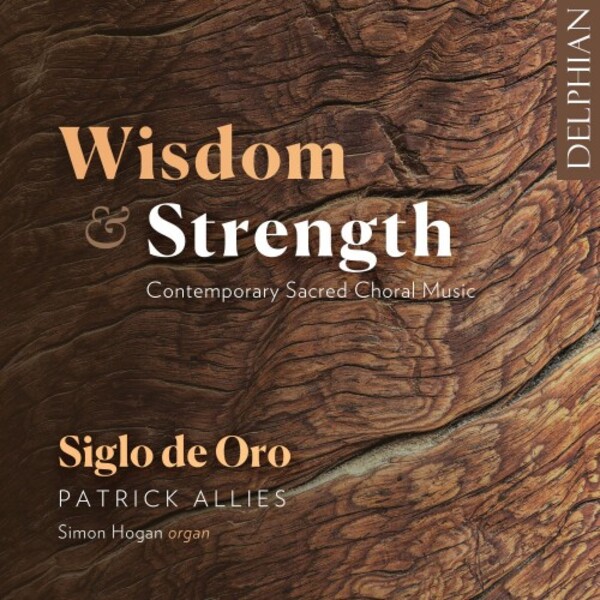Wisdom & Strength: Contemporary Sacred Choral Music
View record and artist detailsRecord and Artist Details
Genre:
Vocal
Label: Delphian
Magazine Review Date: 04/2025
Media Format: CD or Download
Media Runtime: 69
Mastering:
DDD
Catalogue Number: DCD34337

Tracks:
| Composition | Artist Credit |
|---|---|
| O lux beata Trinitas |
Kerry Andrew, Composer
Patrick Allies, Conductor Siglo de Oro |
| Christ, our Paschal Lamb |
Kristina Arakelyan, Composer
Patrick Allies, Conductor Siglo de Oro Simon Hogan, Organ |
| Media Vita |
Kerensa Briggs, Composer
Patrick Allies, Conductor Siglo de Oro |
| Flamed Tongue |
Marisse Cato, Composer
Patrick Allies, Conductor Siglo de Oro |
| Haec dies |
Sarah Cattley, Composer
Patrick Allies, Conductor Siglo de Oro |
| Worthy is the Lamb |
Joanna Marsh, Composer
Patrick Allies, Conductor Siglo de Oro Simon Hogan, Organ |
| Psalm 59 |
Shruthi Rajasekar, Composer
Patrick Allies, Conductor Siglo de Oro Simon Hogan, Organ |
| Nunc dimittis |
Amy Summers, Composer
Patrick Allies, Conductor Siglo de Oro |
| Gloria tibi Trinitas |
Judith Ward, Composer
Patrick Allies, Conductor Siglo de Oro Simon Hogan, Organ |
| In manus tuas |
Judith Ward, Composer
Patrick Allies, Conductor Siglo de Oro |
| Mass for St Mark |
Judith Ward, Composer
Patrick Allies, Conductor Siglo de Oro Simon Hogan, Organ |
| O clap your hands |
Judith Ward, Composer
Patrick Allies, Conductor Siglo de Oro |
| Responses |
Judith Ward, Composer
Patrick Allies, Conductor Siglo de Oro |
| Magnificat |
Alison Willis, Composer
Patrick Allies, Conductor Siglo de Oro |
Author: Jeremy Dibble
This album belongs to that interesting genus of recordings in which liturgy and sacred music are brought together to recreate a particular service or feast day. One thinks particularly of carol services for Advent, Christmas, Epiphany and Candlemas, and the distinctive music and texts for Ash Wednesday, Holy Week, Easter, Ascension and Pentecost, not to mention Trinity Sunday. In this instance, the vocal ensemble Siglo de Oro and their director Patrick Allies have resourcefully sought to recreate a scheme of Sunday worship with works by contemporary composers, extending the concept to incorporate pieces written for the most significant parts of the church calendar.
Proceedings begin with two motets for Compline (often sung in an Anglican context late on the previous Saturday night). The first, Kerensa Briggs’s setting of Media vita – a Lenten antiphon sung prior to the Nunc dimittis and commissioned by Siglo de Oro in 2015 to mark the 500th anniversary of the Tudor composer John Sheppard – is a sumptuous multi-voiced affair; the second, a Sarum responsory In manus tuas by Judith Ward, whose music is a central feature of the album, is infused with the influence of plainchant and modal inflection. The ‘ordinary’ movements (save the Credo, often omitted nowadays as a sung liturgical item because of its length) of Ward’s Mass for St Mark occupy the Eucharist. This is nicely crafted music (the Kyrie and Agnus Dei especially so), liturgically practical, well conceived for the choir, and its not unduly technically challenging harmonic palette is one that is deftly designed to be accessible to both professionals and accomplished amateurs. Interspersing the Mass movements are two motets – Sarah Cattley’s fanfare-like Easter antiphon Haec dies and Joanna Marsh’s double-choir Worthy is the Lamb (a well-known Easter text from the book of Revelation) – and, at the end of the Mass, Kristina Arakelyan’s expressive communion motet Christ, our Paschal Lamb. Ward’s rhythmically animated O clap your hands provides a substantial coda as a ‘choral voluntary’.
The second half of the recording is devoted to music for the particularly English tradition of Choral Evensong (one essentially unchanged since the Reformation). Marisse Cato’s Flamed Tongue (another commission) constitutes the introit, an intriguingly pictorial representation of verses relating to the drama of Pentecost, and this is followed by Ward’s Responses and a setting of Psalm 59 (a text characterised by its sense of hostility and violence) to an appositely astringent double chant by Shruthi Rajasekar. Alison Willis’s 2017 setting of the Magnificat, unusually a cappella (whereas most settings are heard with organ), and originally intended to be heard alongside Arvo Pärt’s Nunc dimittis, is a reflective interpretation of the traditional text of the Annunciation; it is paired with a similarly contemplative setting of Simeon’s valedictory declaration by Amy Summers, sung in Latin as a foil to the English of the Magnificat. After the second ‘phase’ of Ward’s responses, the fourth-century text (attributed to St Ambrose) acclaiming the Trinity (and one sung traditionally at Saturday Vespers and on Trinity Sunday), O lux beata Trinitas, forms the ‘anthem’. Kerry Andrew’s reading of the text involves a variety of techniques ranging from ostinato to aleatoricism, free metrical intonation and melisma as well as some colourful textural accumulations of sound. To end, Ward’s toccata Gloria tibi Trinitas, replete with plainchant melody, continues the theme of the Trinity as an organ voluntary.
This is an imaginative album, beautifully sung and directed. Credit should also go to the organist Simon Hogan for his sensitive accompaniments and the closing voluntary. The glow of Delphian’s handsomely recorded sound (enhanced by the environment of Waltham Abbey), moreover, brings clarity and breadth to the range of new, interesting and attractive pieces featured here, most of them premiere recordings.
Discover the world's largest classical music catalogue with Presto Music.

Gramophone Digital Club
- Digital Edition
- Digital Archive
- Reviews Database
- Full website access
From £8.75 / month
Subscribe
Gramophone Full Club
- Print Edition
- Digital Edition
- Digital Archive
- Reviews Database
- Full website access
From £11.00 / month
Subscribe
If you are a library, university or other organisation that would be interested in an institutional subscription to Gramophone please click here for further information.




